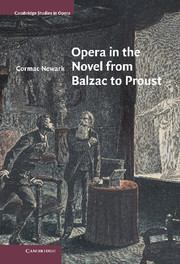Book contents
- Frontmatter
- Contents
- Acknowledgements
- A note on the texts
- Introduction
- 1 Balzac, Meyerbeer and science
- 2 ‘Tout entier?’: scenes from grand opéra in Dumas and Balzac
- 3 The novel in opera: residues of reading in Flaubert
- 4 Knowing what happens next: opera in Verne
- 5 The Phantom and the buried voices of the Paris Opéra
- 6 Proust and the soirée à l'Opéra chez soi
- Envoi
- Notes
- Bibliography
- Index
3 - The novel in opera: residues of reading in Flaubert
Published online by Cambridge University Press: 03 May 2011
- Frontmatter
- Contents
- Acknowledgements
- A note on the texts
- Introduction
- 1 Balzac, Meyerbeer and science
- 2 ‘Tout entier?’: scenes from grand opéra in Dumas and Balzac
- 3 The novel in opera: residues of reading in Flaubert
- 4 Knowing what happens next: opera in Verne
- 5 The Phantom and the buried voices of the Paris Opéra
- 6 Proust and the soirée à l'Opéra chez soi
- Envoi
- Notes
- Bibliography
- Index
Summary
The year 1857 was a turning point in the short but sensational history of the roman-feuilleton: Eugène Sue, father of the genre and of a large and rapidly growing family of new readers of fiction, died, and the Revue de Paris was taken to court for outraging public and religious morals with Madame Bovary. The coincidence is suggestive: Flaubert's masterpiece is the tragedy of a woman whose flaw is that she has read too many novels like Sue's. In the words of Umberto Eco, it is the critical summing-up of a life lived in fiction-induced expectation of an ‘événement’ that would never happen. The novel itself is scarcely less direct. Madame Bovary senior expresses the problem with her daughter-in-law in especially down-to-earth terms:
– Sais-tu ce qu'il faudrait à ta femme? reprenait la mère Bovary. Ce seraient des occupations forcées, des ouvrages manuels! Si elle était, comme tant d'autres, contrainte à gagner son pain, elle n'aurait pas ces vapeurs-là, qui lui viennent d'un tas d'idées qu'elle se fourre dans la tête, et du désœuvrement où elle vit.
– Pourtant elle s'occupe, disait Charles.
– Ah! elle s'occupe! À quoi donc? À lire des romans, de mauvais livres, des ouvrages qui sont contre la religion […].
[“You know what your wife needs?” Madame Bovary senior was taking up the subject once more. “Hard work! Manual work! If she had to earn her bread, like a lot of other people, she wouldn't get the vapours like that. It all comes from the heap of notions she's got into her head, and from having nothing to keep her occupied.” […]
- Type
- Chapter
- Information
- Opera in the Novel from Balzac to Proust , pp. 78 - 109Publisher: Cambridge University PressPrint publication year: 2011
- 1
- Cited by



